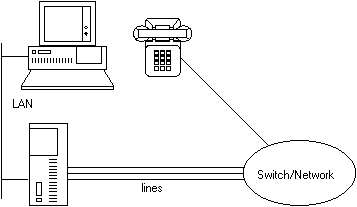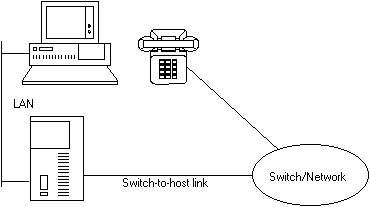2.3.8 Device Independence
The TAPI DLL has no knowledge details about how requests are realized; this is up to the Service Provider implementation. The TSPI is independent of both the telephone network that performs the actual switching (analog, PBX, ISDN, wireless, etc.) and the connectivity scheme used to link the PC to the telephony world. Examples of connectivity schemes between the desktop and the telephone network are illustrated below.
In the first example shown below, the PC is connected to the switch through the desktop phone set. Such phone sets typically connect to the PC via one of its standard serial ports. The functions of the SPI are typically mapped onto commands sent over the serial connection to the phone. These commands are often based on the Hayes AT command set.
 The second example uses a PC add-in card (could also be external add-on box) that has telephony connections to both the switch and the phone set.
The second example uses a PC add-in card (could also be external add-on box) that has telephony connections to both the switch and the phone set.
 The third example shows a LAN-based server with multiple telephone line connections to the switch. SPI operations invoked at any of the client PCs are forwarded over the LAN to the server. The server uses third party call control to implement the client's call control requests.
The third example shows a LAN-based server with multiple telephone line connections to the switch. SPI operations invoked at any of the client PCs are forwarded over the LAN to the server. The server uses third party call control to implement the client's call control requests.
 The fourth example shows a LAN-based host connected to the switch via a switch-to-host link. SPI operations invoked at any of the client PCs are forwarded over the LAN to the host. The host uses third party switch-to-host link protocol to implement the client's call control requests.
The fourth example shows a LAN-based host connected to the switch via a switch-to-host link. SPI operations invoked at any of the client PCs are forwarded over the LAN to the host. The host uses third party switch-to-host link protocol to implement the client's call control requests.
 Note that the PC need not be a desktop PC, it can also be a portable PC or notebook connected to the telephone network via a wireless connection. This is illustrated in the fifth example.
Note that the PC need not be a desktop PC, it can also be a portable PC or notebook connected to the telephone network via a wireless connection. This is illustrated in the fifth example.
 Finally, the TAPI DLL and its clients need to be aware that the PC's connection may be shared by other telephony equipment, as shown below. To operate properly in this arrangement implies that neither the TAPI DLL and its client nor the service provider can make the assumption that it is the only active agent on the line.
Finally, the TAPI DLL and its clients need to be aware that the PC's connection may be shared by other telephony equipment, as shown below. To operate properly in this arrangement implies that neither the TAPI DLL and its client nor the service provider can make the assumption that it is the only active agent on the line.
 Again, the scenarios illustrated above are only meant as examples and should by no means be construed as being the only ways of providing PC to telephony connectivity.
Again, the scenarios illustrated above are only meant as examples and should by no means be construed as being the only ways of providing PC to telephony connectivity. The second example uses a PC add-in card (could also be external add-on box) that has telephony connections to both the switch and the phone set.
The second example uses a PC add-in card (could also be external add-on box) that has telephony connections to both the switch and the phone set.
 The third example shows a LAN-based server with multiple telephone line connections to the switch. SPI operations invoked at any of the client PCs are forwarded over the LAN to the server. The server uses third party call control to implement the client's call control requests.
The third example shows a LAN-based server with multiple telephone line connections to the switch. SPI operations invoked at any of the client PCs are forwarded over the LAN to the server. The server uses third party call control to implement the client's call control requests.
 The fourth example shows a LAN-based host connected to the switch via a switch-to-host link. SPI operations invoked at any of the client PCs are forwarded over the LAN to the host. The host uses third party switch-to-host link protocol to implement the client's call control requests.
The fourth example shows a LAN-based host connected to the switch via a switch-to-host link. SPI operations invoked at any of the client PCs are forwarded over the LAN to the host. The host uses third party switch-to-host link protocol to implement the client's call control requests.
 Note that the PC need not be a desktop PC, it can also be a portable PC or notebook connected to the telephone network via a wireless connection. This is illustrated in the fifth example.
Note that the PC need not be a desktop PC, it can also be a portable PC or notebook connected to the telephone network via a wireless connection. This is illustrated in the fifth example.
 Finally, the TAPI DLL and its clients need to be aware that the PC's connection may be shared by other telephony equipment, as shown below. To operate properly in this arrangement implies that neither the TAPI DLL and its client nor the service provider can make the assumption that it is the only active agent on the line.
Finally, the TAPI DLL and its clients need to be aware that the PC's connection may be shared by other telephony equipment, as shown below. To operate properly in this arrangement implies that neither the TAPI DLL and its client nor the service provider can make the assumption that it is the only active agent on the line.
 Again, the scenarios illustrated above are only meant as examples and should by no means be construed as being the only ways of providing PC to telephony connectivity.
Again, the scenarios illustrated above are only meant as examples and should by no means be construed as being the only ways of providing PC to telephony connectivity.